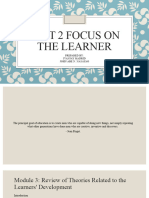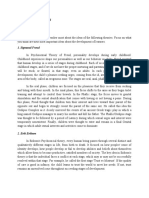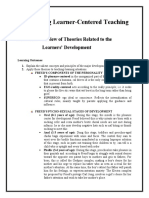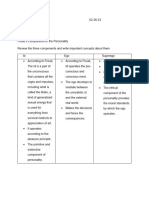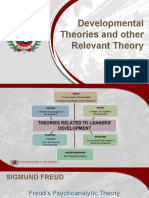Session 2 AssignmentActivity
Uploaded by
KarieDetoreTolonesSession 2 AssignmentActivity
Uploaded by
KarieDetoreTolonesSession 2 Activity/Assignment
Identifying key concepts and their application to teaching and learning (30 points)
Name: KARIE MAE D. TOLONES
Direction: Fill-out the following table. On the 3rd column, discuss in your OWN WORDS the important concepts and describe the
levels of development. On the 4th column, write the implications or applications of the theories to classroom or teaching-learning
using your OWN WORDS. Do not just copy-paste from external sources.
Developmental Learning Theories
Theorist Theory/Theories Important Concepts/Levels of Implications/ Applications to
Development Classroom or Teaching-Learning
Sigmund Stages of Psychosexual As described in the Psychosexual Freud's Theories assist teachers in
Freud Development; Development, the libido or the understanding the developmental
Psychoanalytic Theory psychosexual energy is the driving force of characteristics of their students,
the human behavior. In this theory, Freud allowing them to improve their
suggested that there are 5 psychosexual understanding of the students while
stages that leads to personality also recognizing that individuals in the
development, and these are the oral, anal, process of growth and development
phallic, latent, and genital stages. In the progress through various stages at
oral stage, the baby has a thumb-sucking different rates. Each person is clearly
tendency which may lead to oral fixation if different and possesses distinct
it will not be given an attention. That is characteristics. This is obvious since
why there are some people who bites their no two individuals are exact copies;
nails or smokes if they are under stress. they vary widely in terms of
The anal stage is dependent on the toilet intellectual ability, skill sets, and other
training of the parents. If the parents capabilities. As a result, the teacher
provide support and impose strict training must accept the learners' differences
at this stage, the child will develop an anal- and provide instruction tailored to
retentive personality who hates mess and their specific needs.
wants everything to be in order, while
parents who are less strict and doesn’t
provide encouragement will cause the child
to develop an anal expulsive personality
which is characterized by being
disorganized and careless. In the Phallic
Stage, the child is now aware of the
physical difference between boy and girl.
This causes the boys to develop an
Oedipus complex and Electra complex for
girls. In the latent stage, the sexual urge
or desire of the child is hidden and their
focus at this stage is primarily on building
relationship with the society especially with
their family and peers. The last stage is the
genital stage wherein the libido is once
again active thus the individual develops
sexual interest to the opposite sex.
Psychoanalysis theory suggested that
human behavior is influenced by the
interaction of the 3 components of the
mind, the Id, Superego, and Ego. The Id
primarily operates unconsciously. This is
the aggressive, arrogant, and self-centered
part of the mind. The superego serves as
the conscience of the mind that complies
to the society’s moral code. Lastly, the ego
which is the rational part of the mind and
blocks irrational thinking. It balances the id
and the superego.
Erik Erikson Psycho-Social Theory of The Psycho-Social Theory of Development Using the Psycho-Social Theory of
Development focuses on how social interactions can Development, the teachers will have a
affect the growth and development of the better understanding on the influence
individuals. Erikson believed that if a of social interaction to the learning of
person experiences a conflict and he or she the students. Through this knowledge,
will overcome it, then that is when they will allow their students to take
development occurs. He devised 8 stages charge in activities and on their
of Psycho-Social Development namely the: personal learning. These activities
Infancy stage, Early Childhood Stage, must also include their interest and
Preschool Age Stage, School Age, allows them to interact with their
Adolescence Stage, Young Adulthood classmates or people outside the
Stage, Middle Adulthood Stage, and Late classroom.
Adulthood Stage.
Jean Piaget Stages of Cognitive The Cognitive Development Theory of Through Piaget’s theory on Cognitive
Development Piaget suggests that intellectual abilities development, the teacher can be able
changes as the individual grows. In short, to identify the appropriate teaching
children gradually become logical thinker strategies that matches their students’
as they become adults. Piaget’s Theory cognitive level. For example, if the
explains how our cognitive aspect develops teacher teaches senior high school
in 4 stages: Sensorimotor, Pre-operational, students, he or she must deliver
Concrete Operational, and Formal information in more advance manner
Operational Stages. compared to kindergarten teachers.
Lawrence Stages of Moral Kohlberg’s Theory of Moral Development The theory on Moral Development
Kohlberg Development emphasizes that our cognitive educates the teachers to acknowledge
development evolves in the three levels of the different moral perspective of the
moral reasoning: pre-conventional, students and can use it in the learning
conventional, and post-conventional. Each process. After identifying the learners’
level has their two separate stages. morality level, the teachers can create
ways on how to advance their moral
In the Pre-conventional morality, the child thinking.
is not yet aware or internalized the
situations that the society’s considered as
right and wrong, and their decisions are
solely based on external consequences.
The two stages under this level are the
Obedience and Punishment Orientation
(Stage 1) and the Individualism and
Exchange (Stage 2).
In the Conventional morality, the sense of
morality of the individual is tied to the
social rules. The two stages under this
level are the Good Interpersonal
relationships (Stage 3) and the
Maintaining the Social Order (Stage 4).
In the Post-Conventional Morality, the
person reaches the realization that
individuals may disobey the rules set by
the society if it does not coincide with
their own principles. They don’t simply
obey without questioning. The two stages
are Social Contract and Individual Rights
(Stage 5) and Universal Principles.
Lev Vygotsky Sociocultural Theory, ZPD Vygotsky’s theory stresses the importance Using Vygotsky’s Theory, the teacher
of social interaction for cognitive can guide the learners on their
development via guided learning or the learning process especially on the
zone of proximal development. For areas that they need assistance.
Vygotsky, cognitive development of the Teachers can also apply the
child without guidance will delayed Scaffolding method by mainly focusing
compared to those who are guided by their on the honing process of students’
parents or guardians. weaker areas.
Urie Bioecological Systems The Bioecological Systems Theory Bronfenbrenner's Bioecological
Bronfenbrene Theory emphasizes that the environment in which Systems Theory can be applied in
r the child interacts or grew has a huge teaching by identifying and
influenced to his or her growth and establishing a conducive learning
development. According to environment for the students. For
Bronfenbrenner, there are multiple example, one way for the DepEd
environments that causes the external teachers to be part of the microsystem
influence on the child’s development: of the students, they conducted home
Microsystem, Mesosystem, Exosystem, visitation every end of the quarter to
Macrosystem and the Chronosystem. know the student better as well as
their families and living environment.
Rubric for Scoring the Assignment
Level of Description
Performanc
e
Exceptional Thorough and detailed analysis or understanding of the topic; provides justifications for all points; Writing is
(26-30) clear, concise, and well organized; thoughts are expressed in a coherent and logical manner.
Excellent (21- Complete understanding or analysis of the topic; justifications for most points; Writing is mostly clear,
25) concise, and well organized; thoughts are mostly expressed in a coherent and logical manner.
Very Good Mostly complete understanding or analysis of the topic; justifications for some points; Writing is quite
(16-20) unclear and/or disorganized.
Acceptable Incomplete understanding or analysis of the topic; justifications provided for some points though incomplete;
(11-15) Writing is mostly unclear and/or disorganized. Thoughts ramble and make little sense.
Poor (0-10) Incomplete understanding or analysis of the topic; justifications inadequate or not present; Writing is unclear
and disorganized; thoughts ramble and make no sense.
You might also like
- Ipcrf-Development Plan: Passi National High School100% (11)Ipcrf-Development Plan: Passi National High School4 pages
- Theories Related To The Learner's Development84% (37)Theories Related To The Learner's Development30 pages
- Facilitating Learning - Module 3 - Review of Theories Related To The Learners' Development100% (4)Facilitating Learning - Module 3 - Review of Theories Related To The Learners' Development9 pages
- Module 3 Prof Educ 6 Part 2 Focus On The LearnerNo ratings yetModule 3 Prof Educ 6 Part 2 Focus On The Learner14 pages
- Republic of The Philippines University Town, Northern SamarNo ratings yetRepublic of The Philippines University Town, Northern Samar15 pages
- Developmental Theories and Other Relevant TheoriesNo ratings yetDevelopmental Theories and Other Relevant Theories57 pages
- Pamela M. Balagtas Beed 2E: 1. Sigmund FreudNo ratings yetPamela M. Balagtas Beed 2E: 1. Sigmund Freud3 pages
- Facilitating Learner-Centered Teaching: Module 3 - Review of Theories Related To The Learners' DevelopmentNo ratings yetFacilitating Learner-Centered Teaching: Module 3 - Review of Theories Related To The Learners' Development15 pages
- Educ8 - Special and Inclusive Education Module5No ratings yetEduc8 - Special and Inclusive Education Module56 pages
- Module 1-PRELIM: Southern Baptist College M'lang, CotabatoNo ratings yetModule 1-PRELIM: Southern Baptist College M'lang, Cotabato11 pages
- Focus On The Learner Review of The Development TheoriesNo ratings yetFocus On The Learner Review of The Development Theories16 pages
- Prof Educ 6 Part 2 Focus On The LearnerNo ratings yetProf Educ 6 Part 2 Focus On The Learner13 pages
- Facilitating Learner Centered Teaching DiscussionsNo ratings yetFacilitating Learner Centered Teaching Discussions211 pages
- THEORIES-RELATED-TO-LEARNERS-DEVELOPMENT-STORY-REPORT (1)No ratings yetTHEORIES-RELATED-TO-LEARNERS-DEVELOPMENT-STORY-REPORT (1)30 pages
- Educ 201 - 2-Sedm1 - Domingo - Activity1No ratings yetEduc 201 - 2-Sedm1 - Domingo - Activity13 pages
- Review of Therories Related To Leaners DevelopmentNo ratings yetReview of Therories Related To Leaners Development37 pages
- Comprehensive Exam - Foundations of Education100% (1)Comprehensive Exam - Foundations of Education8 pages
- Module 03 Lesson 01 Review of Theories Related To The Learners DevelopmentNo ratings yetModule 03 Lesson 01 Review of Theories Related To The Learners Development17 pages
- Module 3 - Review of Related Theories Copy [Autosaved] (1)No ratings yetModule 3 - Review of Related Theories Copy [Autosaved] (1)10 pages
- How to Study and Understand Anything: Discovering The Secrets of the Greatest Geniuses in HistoryFrom EverandHow to Study and Understand Anything: Discovering The Secrets of the Greatest Geniuses in History5/5 (3)
- Gale Researcher Guide for: Overview of Physical, Cognitive, and Moral Development in PsychologyFrom EverandGale Researcher Guide for: Overview of Physical, Cognitive, and Moral Development in PsychologyNo ratings yet
- Raising An Emotionally Intelligent Child: What It Actually TakesFrom EverandRaising An Emotionally Intelligent Child: What It Actually TakesNo ratings yet
- Fabrication and Experimental Analysis of Carbon Fibre/Epoxy Composite Leaf SpringNo ratings yetFabrication and Experimental Analysis of Carbon Fibre/Epoxy Composite Leaf Spring9 pages
- Trees: Discrete Structures For ComputingNo ratings yetTrees: Discrete Structures For Computing48 pages
- 340090-Causes and Effects of Sludge Formation in Motor OilsNo ratings yet340090-Causes and Effects of Sludge Formation in Motor Oils13 pages
- 11 We'Ll Bite Your Tail, Geronimo by Stilton, GeronimoNo ratings yet11 We'Ll Bite Your Tail, Geronimo by Stilton, Geronimo133 pages
- Foundation Drawings-2: 8 Thick Polymer Cement Mortar Waterproof LayerNo ratings yetFoundation Drawings-2: 8 Thick Polymer Cement Mortar Waterproof Layer1 page
- Handout+Home Assignment For CSE 2022 BATCHNo ratings yetHandout+Home Assignment For CSE 2022 BATCH7 pages
- Experiment 6 HPLC Determination of Ascorbic Acid in WineNo ratings yetExperiment 6 HPLC Determination of Ascorbic Acid in Wine5 pages
- 2024-05-30 Monoammonium Phosphate Process Line Costing InformationNo ratings yet2024-05-30 Monoammonium Phosphate Process Line Costing Information7 pages
- [Ebooks PDF] download Behavior Trees in Robotics and Al: An Introduction 1st Edition Michele Collendanchise full chapters100% (2)[Ebooks PDF] download Behavior Trees in Robotics and Al: An Introduction 1st Edition Michele Collendanchise full chapters65 pages
- Kinetics of Polyethylene Terephthalate (PET) and Polystyrene (PS) Dynamic PyrolysisNo ratings yetKinetics of Polyethylene Terephthalate (PET) and Polystyrene (PS) Dynamic Pyrolysis9 pages
- Cambridge Latin Course Unit 3: Quarter 2: Stage 23: Date Homework Due Lesson Homework All Roads Lead To RomeNo ratings yetCambridge Latin Course Unit 3: Quarter 2: Stage 23: Date Homework Due Lesson Homework All Roads Lead To Rome2 pages
- Học sinh làm bài vào giấy thi: Page - 1No ratings yetHọc sinh làm bài vào giấy thi: Page - 110 pages
- Teelit Date: Oct. 4-8, 2021 Detailed Lesson Plan About LegendsNo ratings yetTeelit Date: Oct. 4-8, 2021 Detailed Lesson Plan About Legends2 pages
- Galactic Human - Handbook - Nidle, Sheldon Argüelles, José A - (José Anthony), 1939 - Forres, 1995 - Forres - Altea Pub - 9780952455554 - Anna's ArchiveNo ratings yetGalactic Human - Handbook - Nidle, Sheldon Argüelles, José A - (José Anthony), 1939 - Forres, 1995 - Forres - Altea Pub - 9780952455554 - Anna's Archive180 pages
- Ipcrf-Development Plan: Passi National High SchoolIpcrf-Development Plan: Passi National High School
- Facilitating Learning - Module 3 - Review of Theories Related To The Learners' DevelopmentFacilitating Learning - Module 3 - Review of Theories Related To The Learners' Development
- Republic of The Philippines University Town, Northern SamarRepublic of The Philippines University Town, Northern Samar
- Developmental Theories and Other Relevant TheoriesDevelopmental Theories and Other Relevant Theories
- Facilitating Learner-Centered Teaching: Module 3 - Review of Theories Related To The Learners' DevelopmentFacilitating Learner-Centered Teaching: Module 3 - Review of Theories Related To The Learners' Development
- Module 1-PRELIM: Southern Baptist College M'lang, CotabatoModule 1-PRELIM: Southern Baptist College M'lang, Cotabato
- Focus On The Learner Review of The Development TheoriesFocus On The Learner Review of The Development Theories
- Facilitating Learner Centered Teaching DiscussionsFacilitating Learner Centered Teaching Discussions
- THEORIES-RELATED-TO-LEARNERS-DEVELOPMENT-STORY-REPORT (1)THEORIES-RELATED-TO-LEARNERS-DEVELOPMENT-STORY-REPORT (1)
- Review of Therories Related To Leaners DevelopmentReview of Therories Related To Leaners Development
- Module 03 Lesson 01 Review of Theories Related To The Learners DevelopmentModule 03 Lesson 01 Review of Theories Related To The Learners Development
- Module 3 - Review of Related Theories Copy [Autosaved] (1)Module 3 - Review of Related Theories Copy [Autosaved] (1)
- How to Study and Understand Anything: Discovering The Secrets of the Greatest Geniuses in HistoryFrom EverandHow to Study and Understand Anything: Discovering The Secrets of the Greatest Geniuses in History
- Gale Researcher Guide for: Overview of Physical, Cognitive, and Moral Development in PsychologyFrom EverandGale Researcher Guide for: Overview of Physical, Cognitive, and Moral Development in Psychology
- Raising An Emotionally Intelligent Child: What It Actually TakesFrom EverandRaising An Emotionally Intelligent Child: What It Actually Takes
- Fabrication and Experimental Analysis of Carbon Fibre/Epoxy Composite Leaf SpringFabrication and Experimental Analysis of Carbon Fibre/Epoxy Composite Leaf Spring
- 340090-Causes and Effects of Sludge Formation in Motor Oils340090-Causes and Effects of Sludge Formation in Motor Oils
- 11 We'Ll Bite Your Tail, Geronimo by Stilton, Geronimo11 We'Ll Bite Your Tail, Geronimo by Stilton, Geronimo
- Foundation Drawings-2: 8 Thick Polymer Cement Mortar Waterproof LayerFoundation Drawings-2: 8 Thick Polymer Cement Mortar Waterproof Layer
- Experiment 6 HPLC Determination of Ascorbic Acid in WineExperiment 6 HPLC Determination of Ascorbic Acid in Wine
- 2024-05-30 Monoammonium Phosphate Process Line Costing Information2024-05-30 Monoammonium Phosphate Process Line Costing Information
- [Ebooks PDF] download Behavior Trees in Robotics and Al: An Introduction 1st Edition Michele Collendanchise full chapters[Ebooks PDF] download Behavior Trees in Robotics and Al: An Introduction 1st Edition Michele Collendanchise full chapters
- Kinetics of Polyethylene Terephthalate (PET) and Polystyrene (PS) Dynamic PyrolysisKinetics of Polyethylene Terephthalate (PET) and Polystyrene (PS) Dynamic Pyrolysis
- Cambridge Latin Course Unit 3: Quarter 2: Stage 23: Date Homework Due Lesson Homework All Roads Lead To RomeCambridge Latin Course Unit 3: Quarter 2: Stage 23: Date Homework Due Lesson Homework All Roads Lead To Rome
- Teelit Date: Oct. 4-8, 2021 Detailed Lesson Plan About LegendsTeelit Date: Oct. 4-8, 2021 Detailed Lesson Plan About Legends
- Galactic Human - Handbook - Nidle, Sheldon Argüelles, José A - (José Anthony), 1939 - Forres, 1995 - Forres - Altea Pub - 9780952455554 - Anna's ArchiveGalactic Human - Handbook - Nidle, Sheldon Argüelles, José A - (José Anthony), 1939 - Forres, 1995 - Forres - Altea Pub - 9780952455554 - Anna's Archive










